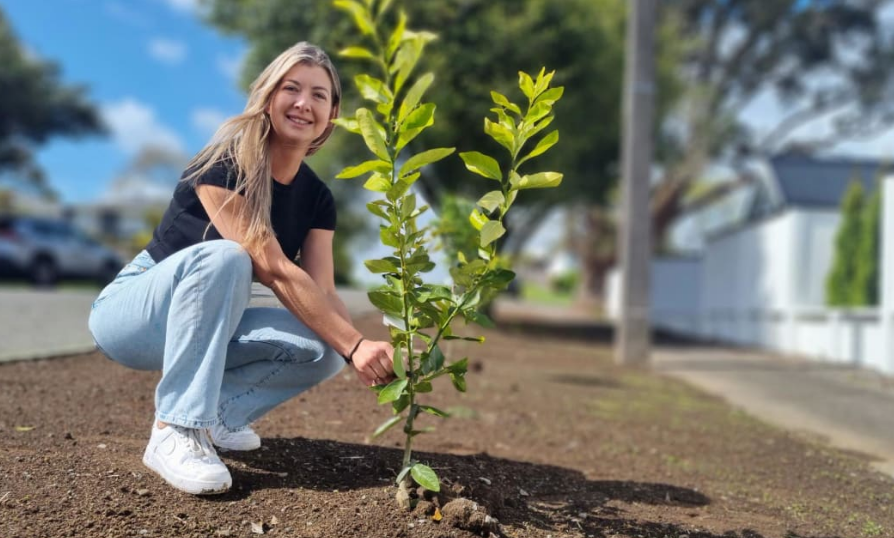
By Robin Martin of RNZ
The daughter of a New Plymouth city councillor is facing a hefty fine after a years-long battle with the council over who is responsible for a massive pohutukawa outside her home.
Frustrated by the lack of council action over the tree - which is growing through power lines - Alana Brough has planted dwarf fruit trees and a vegetable garden in the berm in defiance of the district council’s rules.
Ms Brough was in the process of renovating a two-storey weatherboard home in the leafy inner-city New Plymouth suburb of Vogeltown, including building a new garage with an apartment.
The more than 10m high pohutukawa - which she said was on the council-owned land - towered over the Ballance St project.
‘‘I’ve got this large pohutukawa tree on the corner of my section that is nicely in the power lines and dropping a whole lot of debris everywhere. I asked the council to come and give it a little maintenance trim and they said it wasn’t their asset, therefore, they don’t need to maintain it, so I got a price to get it trimmed at $10,000.’’
Angry at the council’s unwillingness to help, Ms Brough initially sprayed the grass on her 300sq m berm, fed up with mowing somebody’s else’s lawn.
‘‘Two years down the track, I thought maybe it’s time to put something there rather than just having weeds and dirt, which over two years they didn’t complain about me spraying so it obviously wasn’t a problem.
‘‘So, since then I’ve planted some wildflowers, some thyme, some lavender and four dwarf fruit trees and some lettuces and spinach to make it a little bit edible.’’
That got the council’s attention.
‘‘Within six working days I received a letter from council saying to remove the trees and to reinstate it back to grass or else I’ll get a $1000 penalty fee and $50 every day thereafter until they are removed.’’

The council disagreed, pointing out that it was an offence under the Local Government Act to plant out the berm.
‘‘The council has not authorised you to dig up and remove the grass nor to plant the trees or place pavers on its road reserve and requires you to remove them.’’
In regard to the pohutukawa, the council said it prioritised work on trees according to the risk they posed to the public or infrastructure both above and underground.
‘‘Having assessed the pohutukawa, we have found there is no immediate safety issue to address, but would relook at it if that changed. The tree wasn’t planted by us, and we advised if she wants it removed, she could do that - but it would be at her cost.’’
Her father and first-term councillor Max Brough had her back.
‘‘It’s a bit heavy-handed; I think it’s a good time to review the policy which if she’s brave enough to come and do a deputation might come about.’’
He was referring to the zero-waste policy that at present did not include grass clippings.
‘‘We’ve got a zero-waste target and if you look at how many berms there are around town and you calculated the amount of clippings that go somewhere every day, that’s not a zero-waste target if it’s not included in it.
‘‘So, it’s a good opportunity to have a conversation about what else we could let people do.’’
Neighbours had mixed views on the planted out berm.
Jeff was in favour.
"We've got big berms here, there's more outside than there is inside the section, in my case at least, and I think fruit trees that people can pick off are a great idea."
A woman who did not want to give her name was not so keen.
"I didn't think you were allowed to do anything like that and when they first did it, of course, we got all the mud across our driveway. The trees that are out there now are up in the wires."
Warren was a fan.
"To be honest I think it is ridiculous. I've got no problem with the fruit trees. No problem at all."
Another woman thought it was a great idea.
"Kai sovereignty all the way. Food is expensive. It's not an obstruction and what are they going to use it for any way? To water grass?"
Alana Brough intended to make a presentation to council next month lobbying for a change of policy to allow residents to plant out berms as long as they were maintained.













